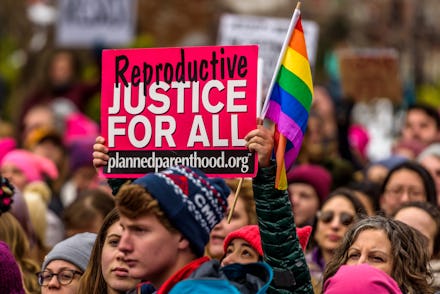Overnight, Texas essentially outlawed abortion

This summer, Texas politicians have escalated their attacks on reproductive rights with the support of Gov. Greg Abbott (R). Just two months ago, Abbott signed two of the nation's most extreme anti-abortion laws. Despite efforts from reproductive rights organizations to block the legislation, Texas's draconian abortion laws went into effect at midnight Wednesday — to the horror of many.
Under the new legislation, pretty much all abortions in Texas are banned after a fetal heartbeat is found. These can be detected as early as six weeks into pregnancy, which is before most people even know they're pregnant. (Six weeks into a pregnancy can often mean just two weeks after a person first misses their period.) In some other states, these heartbeat bills were struck down for being pre-viability abortion bans. Under Roe v. Wade, the Supreme Court noted that states can prohibit abortions after fetal viability, but any attempts to do so beforehand would defy the Roe ruling.
However, Texas found a way to surpass the Supreme Court. Instead of relying on the state to go after people, one of the newly in effect laws allows private citizens to sue anyone helping others access abortions. That not only means abortion providers can be sued, but so can organizations or individuals who help out through other methods, like covering costs or giving someone a ride to the clinic. Those suing can receive at least $10,000 in damages if the lawsuit is successful.
Effectively, Texas turned those who rally against reproductive rights into vigilantes, who now have the state's backing to continue their harassment and intimidation. Last week, reproductive rights organizations, including the Center for Reproductive Rights and the Texas Equal Access Fund, appealed to the Supreme Court to block the bills from taking effect. The emergency petition came after the Fifth Circuit Court of Appeals denied a request to block the laws.
But to no surprise, the conservative-leaning SCOTUS majority decided to let the laws go into effect. Nancy Northup, the CEO of the Center for Reproductive Rights, told Democracy Now! in an interview, "Our client Whole Women's Health was open until 11:59 p.m. last night seeing patients because people wanted to get in and exercise their right to make the decisions for their life, health, and future right up to the midnight hour."
In videos of the bill signing ceremony, Abbott provides his justification for passing the laws, saying, "Our creator endowed us with the right to life and yet millions of children lose their right to life every year because of abortion." He added that the legislature "worked together on a bipartisan basis to pass a bill that I'm about to sign that ensures that the life of every unborn child who has a heartbeat will be saved from the ravages of abortion."
Make no mistake, though. These laws will put plenty of lives at risk. Limiting abortion access is already linked to poor maternal health outcomes. The Center for American Progress reported that this was already seen in Texas, where the rate of maternal deaths rose from 72 deaths per 100,000 live births in 2010 to 148 deaths per 100,000 live births in 2012.
The outlet continued: "Reproductive health experts linked the uptake in maternal deaths to state-based limitations on abortion and reproductive health funding — including cuts to family planning services and a defunding of Planned Parenthood — that occurred during the same window of time."
Although the laws have just gone into effect, the abortion landscape in Texas has radically changed in less than a day. One Twitter user shared that a friend in Texas reported that "zealots brought floodlights to be trained on the procedure rooms to let clients and staff know that they'd be watching, waiting to sue."
So far, a number of politicians, including Reps. Pramila Jayapal (D-Wash.) and Veronica Escobar (D-Texas) have spoken against Texas's near-total abortion ban. On Twitter, Barbara Lee (D-Calif.) wrote, "Texas's anti-abortion law will put the health of millions in jeopardy — especially for low-income people and people of color." Each of the politicians ended their tweets with calls to pass the Women's Health Protection Act.
The fight in Texas is far from over. But now, it has taken on another dimension. Restricting abortions doesn't mean that the people who want one will just go without. Instead, they will be forced to turn to unsafe methods. As organizations continue to fight Texas's laws, the reality for people in need of abortion care in the Lone Star State is a grim one.